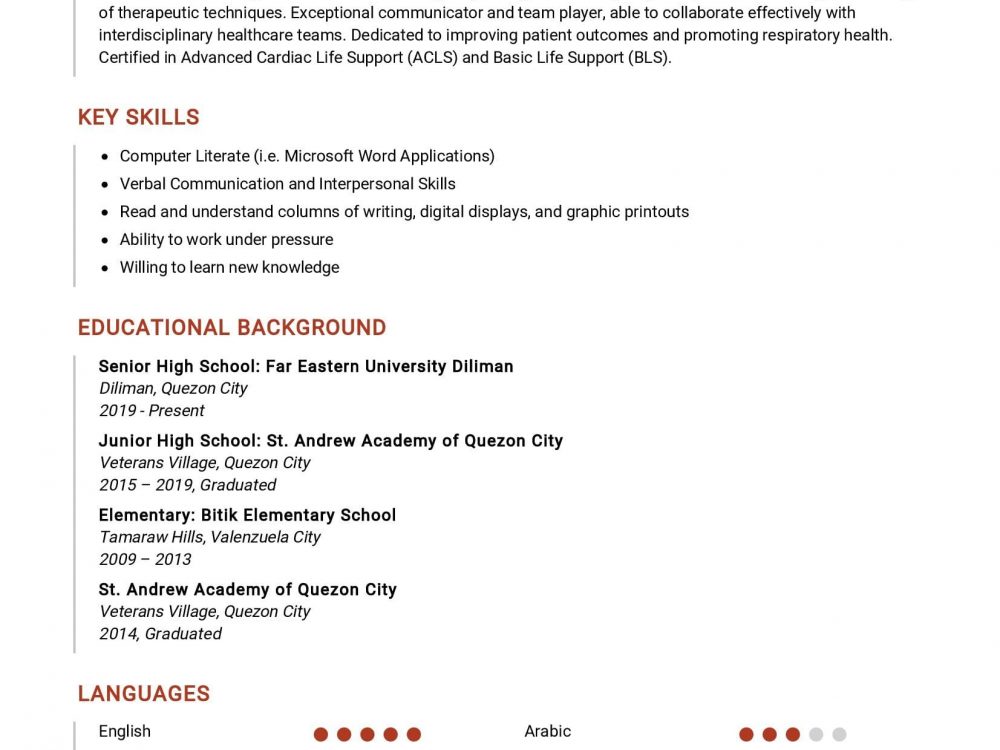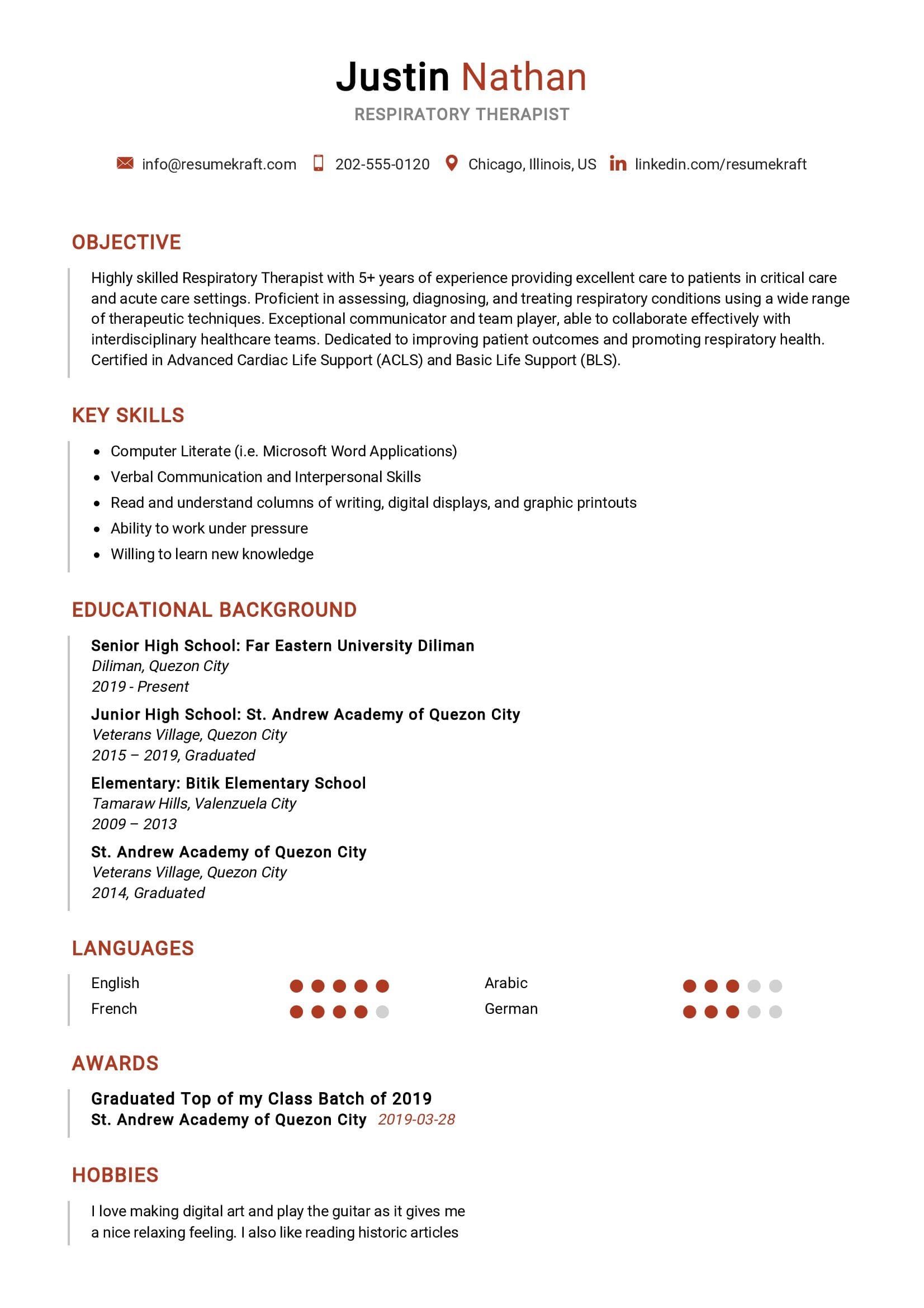Exploring the Role of a Respiratory Therapist
In the ever-evolving landscape of healthcare, the role of a Respiratory Therapist has become indispensable. This position requires a unique blend of technical expertise and compassionate care, playing a crucial role in helping individuals with respiratory issues breathe easier. Let’s delve deeper into the multifaceted responsibilities and requirements that define the job of a Respiratory Therapist, a profession that demands a deep understanding of respiratory care coupled with the ability to provide empathetic patient support.
What are the Respiratory Therapist Job Requirements?
Becoming a Respiratory Therapist involves meeting specific requirements and engaging in a journey of continuous learning and hands-on experience. Let’s explore the prerequisites one needs to fulfill to embrace the role of a Respiratory Therapist:
- A degree in Respiratory Therapy or a related field, showcasing a strong foundation in the medical domain.
- Proficient knowledge of respiratory care techniques, including ventilator management and pulmonary function testing.
- Hands-on experience in respiratory therapy, demonstrating a trajectory of increasing responsibility and proficiency.
- Effective communication and interpersonal skills, crucial for interacting with patients, their families, and other healthcare professionals.
- Adaptability and resilience, as the role often involves working in fast-paced and dynamic healthcare environments.
- Certifications such as the Registered Respiratory Therapist (RRT) credential, showcasing a commitment to professional development.
Acquiring additional certifications in specialized areas of respiratory care can enhance your profile and make you stand out in the competitive healthcare job market.
Responsibilities of a Respiratory Therapist
The role of a Respiratory Therapist is multifaceted, requiring a combination of technical skills and a compassionate approach to patient care. Let’s unravel the core responsibilities that define this vital healthcare role:
- Conducting patient assessments to determine respiratory care needs and developing personalized treatment plans.
- Administering respiratory therapies, including oxygen and aerosolized medication delivery.
- Monitoring and managing mechanical ventilators for patients with respiratory failure.
- Educating patients and their families on respiratory care techniques and at-home treatments.
- Collaborating with other healthcare professionals to develop comprehensive patient care plans.
- Responding to emergency situations, such as assisting during code blue events or rapid response situations.
- Staying updated on advancements in respiratory care and incorporating best practices into daily patient care.
Each responsibility comes with its own set of challenges and learning experiences, shaping you into a competent and compassionate Respiratory Therapist.
Respiratory Therapist Resume Writing Tips
Crafting a resume for the role of a Respiratory Therapist requires attention to detail and a focus on showcasing your unique skills and experiences. Here are some tips to help you create an impactful resume:
- Highlight your hands-on experience in respiratory therapy, emphasizing specific patient cases and outcomes.
- Detail any specialized training or certifications you have obtained in areas such as neonatal/pediatric care or sleep medicine.
- Showcase your communication skills by describing how you educate patients and collaborate with other healthcare professionals.
- Include metrics or specific achievements, such as improvements in patient outcomes or successful implementation of new respiratory care protocols.
- Tailor your resume for each application, emphasizing the skills and experiences most relevant to the specific job description.
Each tip is a brushstroke, helping you paint a compelling portrait of your skills and expertise as a Respiratory Therapist.
Respiratory Therapist Resume Summary Examples
Your resume summary serves as a snapshot of your career, providing a quick overview of your skills and experiences. Here are some examples to inspire you:
- “Compassionate Respiratory Therapist with over 8 years of experience, dedicated to improving patient respiratory outcomes through personalized care and innovative therapies.”
- “Experienced Registered Respiratory Therapist specializing in adult critical care, known for effective collaboration with interdisciplinary teams and commitment to continuous professional development.”
- “Detail-oriented Respiratory Therapist with a focus on pediatric respiratory care, recognized for implementing family-centered approaches and achieving positive patient outcomes.”
Each summary is a window into your career, offering a glimpse of your dedication, expertise, and commitment to patient well-being.
Create a Strong Experience Section for Your Respiratory Therapist Resume
Your experience section is the core of your resume, where you showcase the depth of your expertise and the impact you’ve had in your roles. Here are examples to guide you:
- “Managed a caseload of 20+ patients in a busy ICU, implementing advanced respiratory care strategies that resulted in a 15% improvement in overall patient respiratory function.”
- “Collaborated with a multidisciplinary team to develop and implement a new respiratory care protocol, leading to a 30% reduction in hospital-acquired respiratory infections.”
- “Provided expert respiratory care for pediatric patients, earning recognition for maintaining a 95% patient satisfaction rate and achieving positive outcomes in challenging cases.”
Each experience is a chapter in your career narrative, showcasing your ability to make a meaningful difference in patient care.
Education Section for Your Respiratory Therapist Resume
Your educational background is the foundation of your career in respiratory therapy. Here’s how you can list your educational milestones:
- Bachelor of Science in Respiratory Therapy, XYZ University, a comprehensive program providing a strong foundation in respiratory care, 2014.
- Registered Respiratory Therapist (RRT) Certification, demonstrating a commitment to professional excellence and adherence to industry standards, 2016.
- Advanced Certification in Neonatal/Pediatric Respiratory Care, showcasing specialized training in caring for the unique needs of young patients, 2018.
Each educational qualification is a stepping stone, contributing to your expertise as a Respiratory Therapist.
Respiratory Therapist Skills for Your Resume
Your skill set is your toolkit, equipped with a diverse range of tools honed over the years. It is a showcase of your abilities, both innate and acquired. Let’s list down the essential skills that a Respiratory Therapist should possess:
Soft Skills:
- Empathy and compassion, essential for providing patient-centered care.
- Effective communication, vital for conveying complex medical information to patients and their families.
- Collaboration and teamwork, crucial for working seamlessly with other healthcare professionals.
- Problem-solving abilities, the knack for finding solutions in critical and time-sensitive situations.
- Adaptability and resilience, the ability to navigate and thrive in dynamic healthcare environments.
Hard Skills:
- Ventilator management, showcasing expertise in respiratory support for patients with breathing difficulties.
- Pulmonary function testing, demonstrating proficiency in assessing and diagnosing respiratory conditions.
- Knowledge of respiratory medications and therapies, essential for developing effective treatment plans.
- Critical care expertise, the ability to handle complex cases in intensive care settings.
- Continuous monitoring and assessment skills, crucial for ensuring timely adjustments to treatment plans.
Each skill is a tool, aiding you in providing exceptional care and contributing to positive patient outcomes.
Common Mistakes to Avoid When Writing a Respiratory Therapist Resume
As you craft your resume, it is crucial to steer clear of common pitfalls that can hinder your journey to securing your ideal job in respiratory therapy. Here we list down the mistakes often seen in resumes and how to avoid them:
- Avoid using generic terms; instead, tailor your resume to highlight specific experiences and skills relevant to the respiratory therapy role.
- Quantify your achievements; instead of simply listing job duties, provide measurable outcomes to demonstrate the impact of your work.
- Include a cover letter; take advantage of this opportunity to share your passion for respiratory care and how you align with the organization’s mission.
- Balance technical jargon; ensure your resume is accessible to a broad audience, including those who may not be familiar with all medical terminology.
- Proofread thoroughly; a resume with errors can create a negative impression, so take the time to review and edit your document carefully.
Each mistake is a potential roadblock; avoid them to create a resume that effectively communicates your unique value as a Respiratory Therapist.
Key Takeaways for Your Respiratory Therapist Resume
As we conclude this comprehensive guide, let’s recap the key points to keep in mind while crafting your Respiratory Therapist resume:
- Emphasize your hands-on experience and specific achievements in respiratory therapy.
- Highlight any specialized training or certifications that make you stand out in the field.
- Showcase your communication skills and collaboration with other healthcare professionals.
- Include metrics or measurable outcomes to demonstrate the impact of your work on patient care.
Finally, feel free to utilize resources like AI Resume Builder, Resume Design, Resume Samples, Resume Examples, Resume Skills, Resume Help, Resume Synonyms, and Job Responsibilities to create a standout application and prepare for the Respiratory Therapist job interview.
Armed with these insights and tips, you are now ready to craft a resume that is a true reflection of your journey, your skills, and your commitment to providing exceptional respiratory care. Best of luck!


